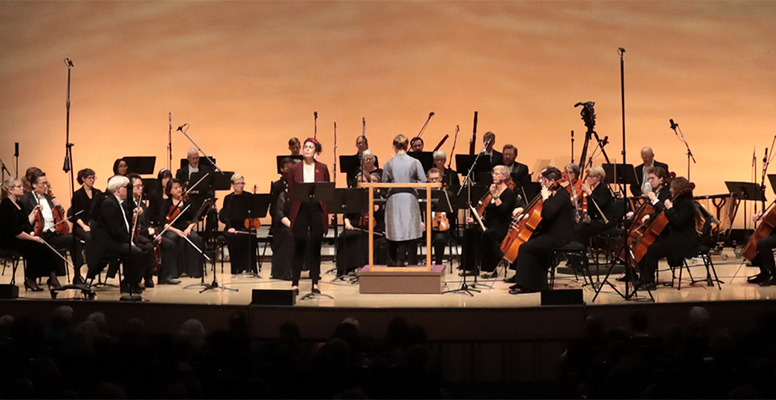We’re Not Done Drumming

Composed: 2018 / Premiered: 2019, Kitchener-Waterloo / Duration: 15 minutes
From Rebecca Thomas:
Canada has tricked us into believing it was right. It has spun a narrative that places Indigenous peoples as primitive, in need of oversight and guardians. We are taught that colonization brought Indigenous-Settler relations.
The first movement of We’re Not Done Drumming signifies pre-contact. This movement is meant to convey confidence, safety, and assurance. Furthermore, it’s to show that there was a thriving civilization prior to Europeans invading what is currently known as Canada.
The second movement is more aggressive and militant. It’s systematic, almost mechanical in its approach and sound. The violence that Indigenous peoples faced is often erased or downplayed as a product of its time. This movement is supposed to make the audience uncomfortable with this history. When creating it, both the writer and composer wanted to capture the perception that European settlers had to justify the subjugation and oppression of Indigenous people, while masking it as benevolence. Here, the first peoples are clearly suffering with little to no regard given to them.
Finally, the third movement is the reclamation of sovereignty and self-governance of Indigenous peoples. Indigenous people are still here. In addition to the survival of Indigenous peoples, the culture and languages of many continue to thrive. Though it can never be what it was in the first movement, there is hope that we can move forward.
We’re Not Done Drumming was a collaboration between composer Laura Sgroi and poet Rebecca Thomas. Symphony Nova Scotia co-commissioned this work together with the Kitchener-Waterloo Symphony.
WE’RE NOT DONE DRUMMING TEXT
I. Newte’k
We were home. We were whole. Where we were, was all we’d ever known.
Our words flowed effortlessly from the tamarack trees to the salmon.
Generations of l’nu knew prosperity and balance.
The animals spoke and taught us how to think.
We remembered just how many plants we should pick.
Netukulimk.
Never taking more than we would need.
We didn’t have concepts of capitalism or greed.
Our women were sacred,
Our children were free.
There was no shame or disease.
This is the way it was, not a romantic history.
Etuaptmunk
So many worlds two eyes can see.
We didn’t need to be given faith just to believe.
We greeted each other in ways we understood.
And welcomed those who stopped by our neighborhood.
Look! On the horizon, great canoes we can see!
Pjila’si, welcome to mi’kma’ki
II. Tapu’kl
Please.
Stop.
Stop the coughs and the pox.
The fevers and spots.
Our lungs are sore.
We can’t take anymore.
You’ve done too much.
Our skin aches to the touch.
You’ve locked us in place.
Put our lives at stake.
You made promises to us.
We wrote them down!
Enough is enough!
You lied and there is no trust.
There’s no stopping this crowned beast.
You don’t care about us in the least.
You made that perfectly clear.
We’ve grown souls from our tears.
Our spirits were just a hindrance.
And then you took away our children.
You took their words and cut their hair.
Their knees bled from all the prayers.
And you were pleased with our despair.
You should be pleased.
We taught you savages how to read.
And this is the thanks we get?
After we dignified you with a royal tete-a-tete.
Lock them away.
Clear the land. We’re here to stay.
What we were supposed to do?
All these resources were not properly being used.
A wasted territory, in our opinion.
We took this wilderness and turned it into a kingdom.
Now get on your knees and take your place.
And thank God for our grace.
III. Ne’siskl
So we’ll hide our colours and stay soft spoken.
Tuck them away but refuse to be broken.
You see, we’ll never stop the fight.
We’ll just wait until the time is right.
Our hearts kept the beat of the drums you made us burn.
And we whispered our stories for our children to learn.
You only saw what you wanted to see.
And your lack of vision is how we stayed free.
So here we are,
Just you and me.
You have to admit.
You’ve made a mess of things.
I refuse to take the blame for where we are at.
But that doesn’t mean I won’t have your back.
You see, when I signed those treaties,
I took them very seriously.
There are two sides to that agreement.
And I don’t need your bereavement.
Only a promise to do better.
From the earnest heart of a settler.
Like it or not.
We’re in this together.
Let me find my voice so we can talk at my pace.
Pjila’si, my friend.
Come in, take your place.
